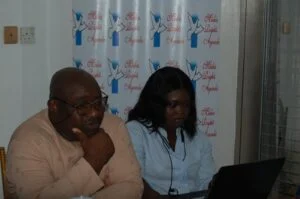Media Rights Agenda (MRA) has said that nearly 15 years after the passage of the Freedom of Information (FOI) Act, its promise of an open and responsive government is yet to be fully realised.
The Executive Director of MRA, Mr. Edetaen Ojo, stated this in his welcome address at a two-day FOI Act workshop for journalists and Civil Society Organisations (CSOs) in the South-West Zone on Friday in Lagos.
Ojo said many public institutions continued to operate in secrecy, often in violation of the law, while citizens, journalists and civil society actors had yet to fully leverage the rights the Act provides.
He explained that MRA regularly conducts capacity-building activities to equip people across various sectors with the knowledge and skills to effectively use the FOI Act.
According to him, access to information is not merely a technical or legal matter but a fundamental right and a cornerstone of democracy.
“Without access to information, citizens cannot meaningfully participate in governance, hold public officials accountable or make informed decisions about issues that affect their lives. The Act provides the legal framework to demand this access.
“However, it is through sustained use, vigilance and advocacy that we can make it work effectively and derive its full benefits,” he said.
Ojo explained that the workshop formed part of MRA’s ongoing efforts to strengthen the ability of journalists and CSOs to use the FOI Act to promote transparency and accountability.
He stressed that participants were expected to apply the knowledge gained to advance good governance in the country.
“Our goal is not only to enhance technical skills but also to build a community of informed and empowered actors among journalists and civil society. By collaborating, sharing experiences and amplifying each other’s work, we can strengthen the effectiveness of the FOI Act and make it a living instrument of democratic governance,” he said.
Ojo reaffirmed MRA’s commitment to advancing accountability and transparency through FOI training, which includes raising public awareness about the Act, its provisions, usage and benefits.
“Over the next two days, we will equip you with the knowledge and practical skills needed to navigate the FOI process — from drafting effective requests to challenging denials and using the information obtained for investigative journalism and advocacy,” he added.
He also announced the call for entries for the 2026 Goodluck Jonathan Freedom of Information Awards and encouraged journalists to participate.
The awards, named after former President Goodluck Jonathan, who signed the FOI Act into law on May 28, 2011, are open to all Nigerian journalists working in print, broadcast, online and multimedia platforms.
According to him, the awards feature two categories:
- Most Active User of the FOI Act, for the journalist with the highest number of verifiable FOI requests made between May 28, 2011, and Dec. 31, 2025; and
- Most Outstanding Promoter of the FOI Act, which recognises exceptional contributions to advancing the Act since its enactment.
“Winning any of these awards can significantly boost your journalistic career,” he said.
Ojo thanked Luminate for supporting the workshop and for its commitment to strengthening transparency and protecting the public’s right to know.
About 30 journalists and CSO representatives from the South-West were trained during the two-day workshop, using resource materials such as Leveraging Digital Tools and Platforms for FOI Requests and Using FOI Requests for Investigative Journalism.


